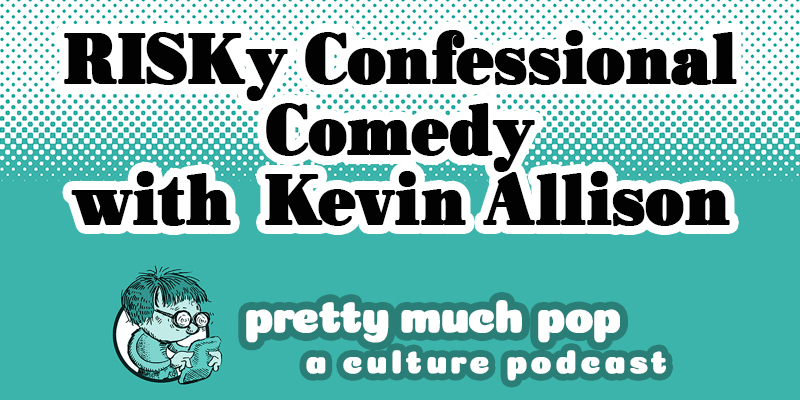Kevin Allison (The State, RISK!) Discusses Confessional Comedy on Pretty Much Pop: A Culture Podcast #70

Kevin was in the infamous, NYU-based sketch comedy group The State which had a show for a season on MTV and seemed like it was going to get picked up by CBS, but no. After several years getting over this disappointment, Kevin discovered a new outlet for his energies: He delivers, curates, and coaches personal stories (bordering on too personal, thus the “risk”) for his stage show and podcast RISK!
Kevin joins your hosts Mark Linsenmayer, Erica Spyres, and Brian Hirt to discuss this idiosyncratic form: Do the stories have to be funny? Can you change things? What’s the relation to autobiographical, humorous essays a la David Sedaris? What might be too personal or actually indicating trauma to actually share on RISK? This seems like something anyone can do, so what’s the role of craft and story-telling history?
Listen to RISK at risk-show.com, and watch many stories on the RISK! YouTube channel. Also: kevinallison.net, thestorystudio.org, and @thekevinallison. Kevin’s story about prostituting himself is about 14 minutes into this episode. Hear Kevin on Marc Maron’s WTF! Listen to that audio guide Kevin mentions, “What Every RISK! Storyteller Should Know.” Read about the four lies of storytelling.
Hear more of this podcast at prettymuchpop.com. This episode includes bonus discussion you can access by supporting the podcast at patreon.com/prettymuchpop. This time, the hosts tell (or at least outline) their own RISK!-like stories, and the result is predictably too personal for our public feed.
This podcast is part of the Partially Examined Life podcast network.
Pretty Much Pop: A Culture Podcast is the first podcast curated by Open Culture. Browse all Pretty Much Pop posts.
Kevin Allison (The State, RISK!) Discusses Confessional Comedy on Pretty Much Pop: A Culture Podcast #70 is a post from: Open Culture. Follow us on Facebook, Twitter, and Google Plus, or get our Daily Email. And don't miss our big collections of Free Online Courses, Free Online Movies, Free eBooks, Free Audio Books, Free Foreign Language Lessons, and MOOCs.
from Open Culture https://ift.tt/33wZtxl
via Ilumina
Comments
Post a Comment